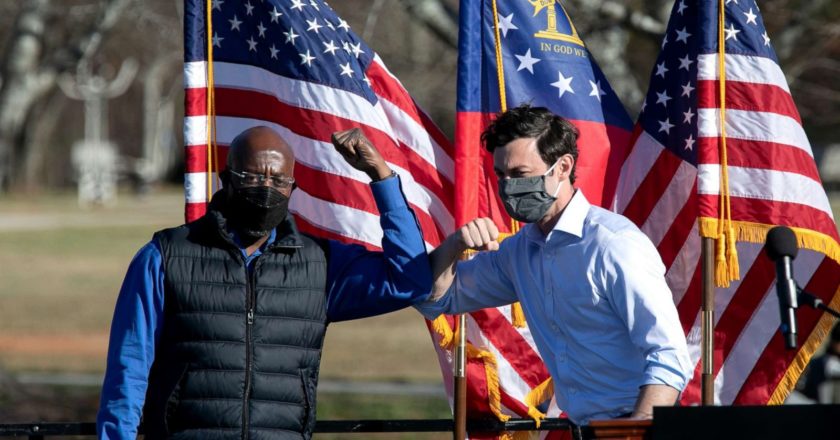On January 6th, it was announced that Democrats Jon Ossoff and Raphael Warnock defeated Republican senators David Perdue and Kelly Loeffler in the Georgia runoff election. This victory for the democratic candidates effectively gave Democrats control of the Senate and the entire legislative branch. A runoff election takes place if no candidate in a general election receives more than 50 percent of the vote. The two candidates with the highest amount of votes in the general election then participate in the runoff election, where one candidate is guaranteed to win the majority of votes.
It is unusual to have two Senate seats up for a vote in an election, but since Senator David Perdue’s six-year term expired in 2020, his seat in the Senate was up for grabs. Additionally, Loeffler was nominated by Georgia’s governor, Brian Kemp, to fill in for Republican Sen. Johnny Isakson, who retired due to health-related concerns. However, she still needed to run in the 2020 election to fill the last two years of Isakson’s term.
During the general election in November, the incumbent Republican candidate, David Perdue, surpassed the Democratic candidate, Jon Ossoff, winning 49.7% of the votes compared to 47.9% for Ossoff. In the second Senate race, incumbent Republican candidate Kelly Loeffler was up against Democrat candidate Raphael Warnock. In November, Warnock received 32.9% of the votes while Loeffler received 25.9%. Since no candidate in either election received more than 50% of the vote, a runoff election was necessary.
The results of this historical election have been achieved through huge turnout rates, especially in Black communities. Black voter turnout for Ossoff increased from 87% in the November general elections to 92% in the runoff, and Warnock won 92% of Black voters. More than 4.4 million people voted, which was larger than the 2016 presidential election turnout, and more than double the amount of voter turnout for the 2008 Senate runoff election, which had held the previous record for voter turnout in a runoff.
Stacey Abrams led the fight to increase Black voter turnout in both the 2020 presidential elections and the Georgia runoffs. After losing to Republican Brian Kemp in the 2018 governor election, Abrams founded Fair Fight, an organization dedicated to addressing voter suppression. Through this organization, she and volunteers spent weeks traveling to low-turnout areas and knocking on people’s doors, hoping to encourage them to vote in the Senate elections. In addition to her group, other voting organizations knocked on millions of doors, encouraging Black voters to register. This movement also included informing those voters about the significance of those last two seats, as well as in helping the Democratic Party gain control of the Senate.
The massive turnout of Black voters propelled Ossoff and Warnock to victory, with Ossoff prevailing with 50.6% as opposed to Perdue with 49.4%, and Warnock winning with 51% against Loeffler’s 49%. Before the results of the runoff, Republicans held a 50 to 48 person majority in the Senate. Because both Democratic candidates were elected to the Senate, the number of Democratic and Republican senators is equal––with 50 each. However, the Democrats now control the Senate due to the tie-breaking vote cast by Vice President Kamala Harris, a Democrat. The results of this election come as good news to Democrats. The Democrat control of the Senate will make it significantly easier for President Biden to continue his agenda and pass bills addressing current issues such as COVID-19 and climate change. However, what makes this election especially significant?
This historical election resulted in Warnock becoming the first African American senator from Georgia, and Ossoff becoming the youngest senator since 1980, as well as the first Jewish senator from Georgia. The increased diversity in the Senate reflects the new progressive direction that the US heads towards with a new Democratic president and a slight Democratic majority in both the House and the Senate.
This small instance of representation is a small victory to some, but, even so, there are still countless ways to improve diversity in the Senate and in the general U.S. government. With social justice movements circulating the internet, it is necessary, now more than ever, to have a government that reflects the true diversity of the country.
There is no doubt that recent elections, including the Georgia runoff, have ushered in a new era of Democratic power in government. Even though this unprecedented diversity may seem like one small victory among a sea of uncertainties that the country faces, progress is progress nonetheless, something that should still be celebrated.
Sources:
https://www.vox.com/21551855/georgia-Ossoff-perdue-loeffler-warnock-runoff-election-2020-results
https://www.voanews.com/2020-usa-votes/understanding-us-senate-runoff-elections-georgia
https://www.politico.com/news/2021/01/07/warnock-Ossoff-flipped-senate-georgia-456310
https://www.washingtonpost.com/politics/interactive/2020/georgia-senate-runoff-guide/
https://www.cnbc.com/2021/01/03/georgia-senate-race-here-are-the-major-issues-at-play.html

